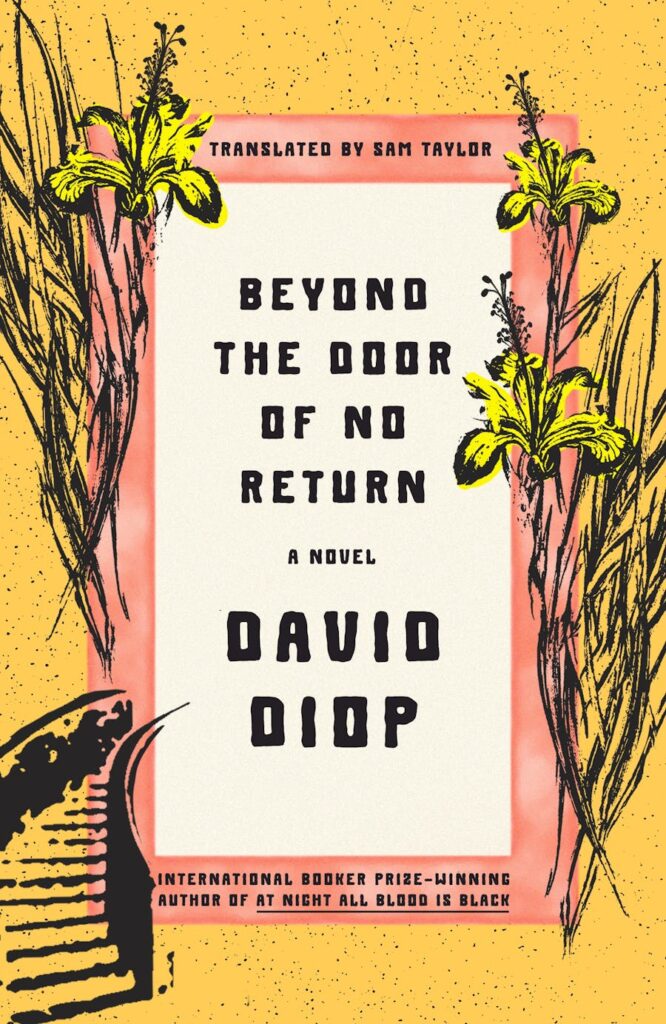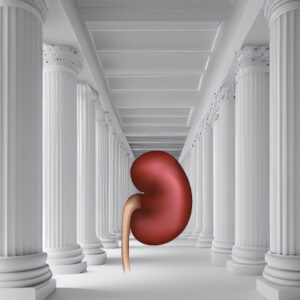
Michel Adanson watched himself die under his daughter’s gaze. He was wasting away, racked by thirst. His joints were like fossilized shells of bone, calcified and immobile. Twisted like the shoots of vines, they tormented him in silence. He thought he could hear his organs failing one after another. The crackling noise in his head, heralding his end, reminded him of the first faint noises made by the bushfire he’d lit one evening more than fifty years before on a bank of the Senegal River. He’d had to quickly take refuge in a dugout canoe, from where—accompanied by the laptots, his guides to the river— he’d watched an entire forest go up in flames.
The sump trees—desert date palms—were split by flames surrounded by yellow, red, and iridescent blue sparks that whirled around them like infernal flies. The African fan palms, crowned by smoldering fire, collapsed in on themselves, shackled to the earth by their massive roots. Beside the river, water-filled mangrove trees boiled before exploding in shreds of whistling flesh. Farther off toward the horizon, the fire hissed as it consumed the sap from acacias, cashew trees, ebony and eucalyptus trees while the creatures of the forest fled, wailing in terror. Muskrats, hares, gazelles, lizards, big cats, snakes of all sizes slid into the river’s dark flow, preferring the risk of drowning to the certainty of being burned alive. Their splashes distorted the reflection of the flames in the water. Ripples, little waves, then stillness.
Michel Adanson did not believe he’d heard the forest moan that night. But as he was consumed by an internal conflagration just as violent as the one that had illuminated his dugout on the river, he started to suspect that the burning trees must have screamed curses in a secret plant language, inaudible to men. He would have cried out, but no sound could escape his locked jaw.
The old man brooded. He wasn’t afraid of dying, but he regretted that his death would be of no use to science. In a final show of loyalty to his mind, his body, retreating before the great enemy, counted off its successive surrenders almost imperceptibly. Methodical even unto death, Michel Adanson lamented his powerlessness to describe in his notebooks the defeats of this final battle. Had he been able to speak, Aglaé could have acted as his secretary during his final agony. But it was too late to dictate the story of his own death.
He hoped desperately that Aglaé would discover his notebooks. Why hadn’t he simply left them to her in his will? He had no reason to fear his daughter’s judgment as though she were God. When you pass through the door to the next world, you cannot take your modesty with you.
On one of his last lucid days, he had understood that his research in botany, his herbaria, his collections of shells, his drawings would all disappear in his wake from the surface of the earth. Amid the eternal churn of generations of human beings crashing over one another like waves would come a man, or—why not?—a woman, another botanist who would unceremoniously bury him under the sands of his ancient science. So the essential thing was to figure in the memory of Aglaé as himself and not merely as some immaterial, ghostly scholar. This revelation had struck him on January 26, 1806: precisely six months, seven days, and nine hours before the beginning of his death.
That day, an hour before noon, he’d felt his femur break under the thick flesh of his thigh. A muffled crack, with no apparent cause, and he almost fell headfirst into the fireplace. Had it not been for Mr. and Mrs. Henry, who had caught him by the sleeve of his bathrobe, he might well have ended up with more bruises and perhaps some burns on his face. They laid him out on his bed and went to get help. And while the Henrys ran through the streets of Paris, he tried to press the heel of his left foot hard against the top of his right foot to extend his injured leg and allow the fractured bones in his femur to snap back into place. He fainted from the pain. When he woke, just before the arrival of the surgeon, Aglaé was on his mind.
He did not deserve his daughter’s admiration. Until then, his only goal in life had been that his “Universal Orb,” his masterpiece, should elevate him to the summit of the botanical world. The pursuit of glory, the jealous recognition of his peers, the respect of scientists all over Europe all of this was mere vanity. He had used up his days and nights meticulously describing close to one hundred thousand “existences”—plants, shellfish, animals of all species—to the detriment of his own. Now, though, he was forced to admit that nothing on earth existed without human intelligence to give it meaning. He would give meaning to his own life by writing it down for Aglaé.
After the unwitting blow dealt to his soul nine months earlier by his friend Claude-François Le Joyand, regrets had begun to torment him. Until then, they had been no more than little sighs of remorse rising up like air bubbles from the bottom of a muddy pond, bursting here and there on the surface without warning, despite the traps his mind had set to contain them. But during his convalescence he had finally managed to master them, to fix them in words. As though divinely ordained, his memories had poured out in order onto the pages of his notebooks, strung together like the beads of a rosary.
Writing had brought him to tears—tears that Mr. and Mrs. Henry attributed to his thighbone. He had let them believe this, let them procure for him all the wine they could get their hands on, replacing the sugar water that he usually drank with a pint and a half of Chablis every day. But drunkenness was not enough to dim the pain of remembering, through the words he wrote in his notebooks, the intensity of his love for a young woman whose features he could barely recall. The contours of her face seemed to have been burned away in the hell of his forgetfulness. How could he translate into simple words the exaltation he had felt when he first saw her fifty years before? In writing about her, he had struggled to restore her to wholeness. And that had been his first battle against death. He had thought it a victory until death caught up with him again. By then, thankfully, he had finished writing his memoirs of Africa. Ripples, little waves of melancholy, and finally resurrection.
Aglaé watched her father die. By the light of a candle placed on his nightstand, a low cabinet with false drawers, he was withering before her eyes. There, in the middle of his deathbed, it seemed to her that only the tiniest fragment of her father remained. He was as thin and dried-up as kindling. In the frenzy of his death throes, his bony limbs gradually lifted up the surface of the sheets that held them down, as if each had its own independent life. Only his enormous head, reclining on a sweat-soaked pillow, emerged from the fabric in which his meager body seemed to be drowning.
This man who had once had long auburn hair, which he would tie in a ponytail with a black velvet ribbon whenever he dressed up to take her out of the convent and drive her to the Jardin du Roi on warm spring days, was now bald. The white down that glistened in the flickering dance of candlelight could not hide the thick blue veins that ran below the surface of the thin skin covering his skull.
Barely visible beneath his bushy gray brows, his blue eyes, sunk deep in their sockets, were glazing over. The fire in those eyes was going out, and, of all the markers of his decline, Aglaé found this the most unbearable. Her father’s eyes were his life.
He had used them to examine the tiniest details of thousands of plants and animals, to tease out the secrets hidden within their sinuous veins, whether filled with sap or blood.
That power to penetrate the mysteries of life, which his eyes had gained from entire days spent scrutinizing specimens, was still palpable when their gaze was turned on Aglaé. His eyes probed her to her very depths, and her thoughts— even the most secret, the most microscopic of them—were seen. In such moments she was not merely one of God’s creations among many others, but became one of the essential links in the great universal chain. Used to scrutinizing the infinitesimal, his eyes suspended her against the boundless background of infinity as if she were a star fallen from the sky, put back in its precise place alongside billions of others, having thought itself lost forever.
Now drawn inward by suffering, her father’s gaze no longer had anything to tell her.
Indifferent to the acrid stench of his sweat, Aglaé leaned close to him as she would have done to an unexpectedly wilting flower. He tried to say something. From very close, she watched his lips move, deformed by the passage of a series of stammered syllables. He pursed his lips, then let a sort of wheeze escape from between them. At first she thought he was saying “Maman,” but in fact it was something like “Ma Aram” or “Maram.” He kept repeating it, over and over, until the end. Maram.
__________________________________
From Beyond the Door of No Return by David Diop; translated from the French by Sam Taylor. Published by Farrar, Straus and Giroux. Copyright © 2021 by Éditions du Seuil. Translation copyright © 2023 by Sam Taylor. All rights reserved.

